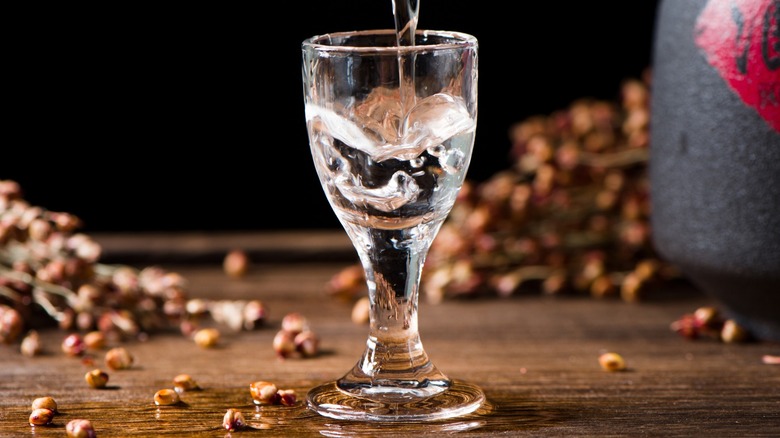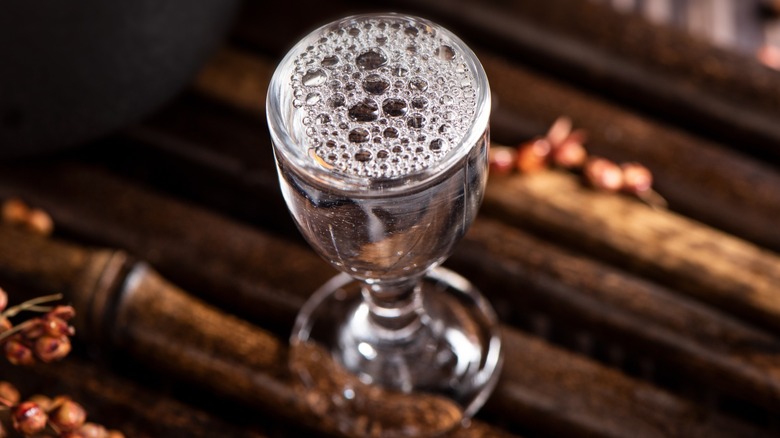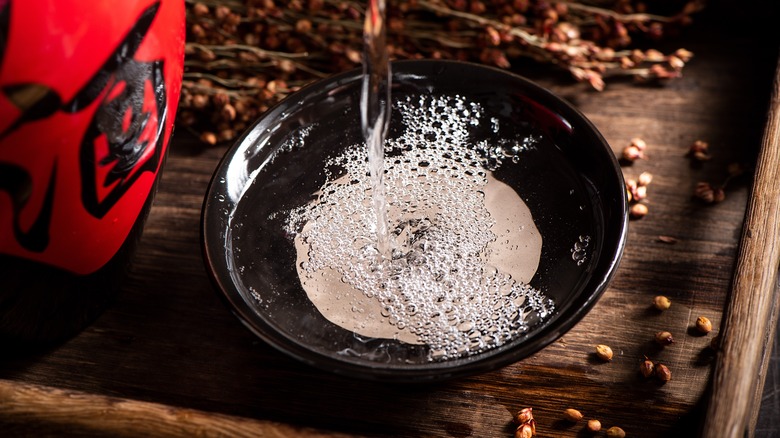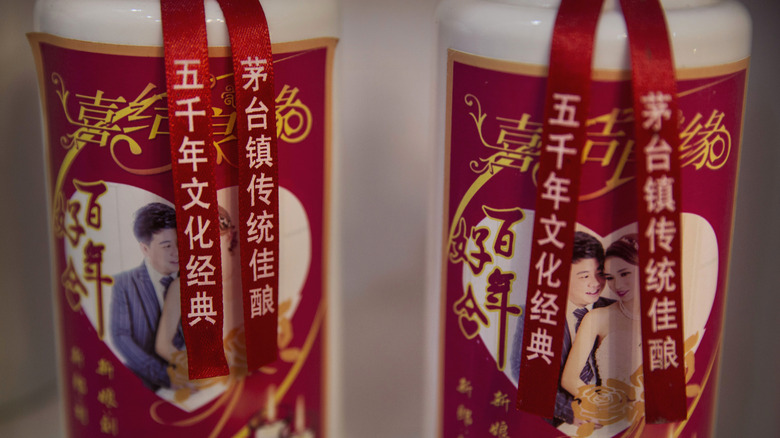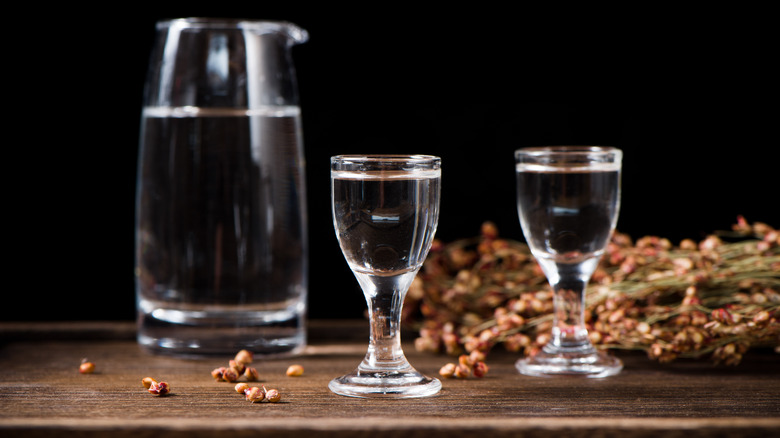What To Know About The 4 Main Types Of Baijiu Before Drinking
In the United States, baijiu (pronounced "bye-joe") isn't the most well-known spirit, with only a recent introduction to the cocktail and drinking scene. However, it's actually the top-selling liquor globally, thanks to a long tradition of consumption in China. As more bottles spread stateside, it's a grain spirit worth getting acquainted with.
For starters, baijiu's fermentation process is fascinating. Unlike most Western spirits, the grains — which include sorghum, rice, maize, and wheat — are typically fermented in solid form. The process usually takes place in an open pit that absorbs wild yeasts and microbes. However, some producers also preserve centuries-old yeasts, yielding traditional takes on the liquor.
Such an open-ended distillation process creates a diverse and complex palate. Notes range from tropical fruit to caramel, soy sauce, umami, and everything in between. Like the many types of rum, baijiu can be delineated into several substyles. However, it's most generally categorized into four main types: strong aroma, light aroma, sauce aroma, and rice aroma. By familiarizing yourself with each respective style, you can open yourself up to the captivating complexity of this spirit.
Strong aroma baijiu is tropical and boozy
This baijiu style lives up to its name — it offers a hefty dose of fruit and grain-like flavor. Expressions are often sweet, with a nose and palate that recalls tropical notes, complemented with a dose of funk. Occasionally, there are also hints of spice, with anise and white pepper flavors. However, this type of baijiu is dependably potent, so brace yourself for a bold, boozy character.
Strong aroma baijiu is typically made from sorghum grass, sometimes mixed with other grains. Unlike other types, the baijiu's fermentation occurs underground, with the liquor spending up to a decade in these earthenware containers. Such lengthier aged varieties are among the most expensive baijiu expressions, further rested in the bottle before being distributed in special releases.
Strong aroma baijiu is the most popular type, accounting for nearly 70% of sales. Varieties from Sichuan are particularly famous, but the spirit is also produced in Shandong, Jiangsu, and Anhui provinces. So, if it's your first foray into this liquor style, the strong aroma is a common entry point.
Light aroma baijiu packs in the alcohol
Hailing from northern China, light aroma baijiu is a particularly boozy interpretation of the liquor. Many expressions sit above 60% alcohol by volume (ABV), making it one of the most high-proof styles of an already strong spirit. However, this variety is less bold in flavor to counterbalance its potent nature, hence its light aroma name.
Sorghum is the principal ferment, sometimes accompanied by peas and barley. This lends the baijiu a floral nose with melon-like notes. The liquor's sweet and likable nature also extends to the tongue, with notes of dried fruit and delicate herbal flavors. In fact, this style recalls the flavor of vodka with its nuanced palate.
Light aroma baijiu is crafted in stone jars, pits, or glass containers. It's convenient to make in large batches, and the production is quick — requiring only half a year. As a result, light aroma baijiu is among the most affordable varieties and is a popular baijiu for everyday drinking, especially in Beijing.
Sauce aroma baijiu offers complex, savory flavors
A style completely distinct from the rest, sauce aroma baijiu brings notes of China's celebrated condiment: soy sauce. In fact, the bottled pantry staple is also created with dry grain fermentation called qu, so its flavor overlap is more than a coincidence. In addition to such salty, fermented notes, sauce aroma baijiu offers a mix of umami, rice, and even cucumber flavors. On the nose, the spirit may smell like varying types of soy sauce or herbs. It's a bold drink with a distinct, savory palate that captivates drinkers.
Its creation process is complicated, involving more steps than other baijiu types. There are several fermentation stages, followed by an intricate eight-step distillation, which extends over a year-long process. Sometimes, producers also add legumes during the creation, furthering associations with other soy-based ingredients. As is common with baijiu, sorghum is the fermentation base.
This liquor style comes from the Guizhou Province and is closely associated with the town of Maotai. Some of China's most esteemed baijiu distilleries are based here, including Kweichow Moutai Co., which crafts a specialized version of the spirit known as moutai that is used during prominent political functions. Bottles of this booze are often aged, with the price heavily increasing over time, making it some of the most coveted baijiu around.
Rice aroma baijiu is a softer, less boozy take on the spirit
Crafted principally from rice, this style of baijiu offers a gentler experience than other versions of the spirit. It's made with both short and long-grain rice, which is fermented in a liquid — a unique quality, as most baijiu is dry fermented. The initial production stages mirror that of mijiu, the Chinese rice wine useful in cooking, except the alcohol is later distilled to create the liquor.
Rice aroma baijiu has a pleasant citrusy and grain-like smell. It is a clear spirit with a mild taste, with soft notes of honey, grass, and tea. Its floral palate recalls other rice-based Asian ferments like sippable Japanese sake and Korean soju. And it's much less boozy than other baijiu types, with most expressions in the range of 30% to 40% ABV.
The liquor is predominantly distilled in traditional fashion in southeastern China, with most consumption confined to the region. It's made with a continuous still versus multiple distillations and is aged for a year after creation. Such production comes with a more approachable pricetag, while the flavor is nonetheless delicious, making this baijiu a local favorite.
